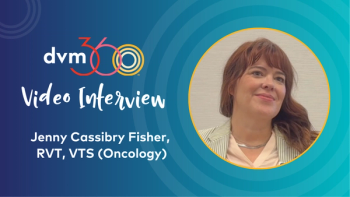
How I'd change veterinary school
Dr. Sarah Wooten's raw thoughts on how her four years of school could have better prepared her for the real world.
Dr. Sarah Wooten takes a candid look back on vet school.I graduated from veterinary school [ahem] years ago and was intrigued with the concept of the
Here's my completely unfiltered list (warning: brutal, honest truth here):
1. Make it so that students only study and become licensed to treat the species they intend to treat after graduation. For example, I would not study cows, horses or anything except dogs and cats because that's what I want to see. As a small animal veterinarian who is never going to practice on horses, cows, or goats, all that s*** was a complete waste of my time.
2. Stop wasting an entire year on biochemistry, something that everybody already had as a prerequisite to get in-memorizing stuff like the Krebs cycle and other crap we never, ever use.
3. Condense reproduction into one semester and only give the basics for small animal students who intend to go into private practice. Almost every animal I see is spayed or neutered. How much time do I need to spend memorizing rare fetal birth defects in one-eyed sheep fetuses because they ate furry cabbage? If you intend to do repro, then that can be an elective.
4. Make pathology one semester. Just the basics.
5. Dump epidemiology and statistics, unless you're going into public health.
6. Expand nutrition to teach us what we need to know and how to have conversations with clients about food and counseling and following up on obesity cases.
7. Focus dentistry on extractions, prophylaxis and critical client conversations about dental health wellness. Save all the fancy stuff for elective material if students want to learn more.
Dr. Downing weighs in: Get them talking early!
Exposure to real patients and real clients and training in effective communication should start in the first year. We learn in many complex ways, but we know that repetition helps to build expertise as does in-person exposure to skill sets. Get students in the same space with patients and clients right away!
-Robin Downing, DVM, DAAPM, DACVSMR, CVPP, CCRP, CVA, MS
8. Add an entire year of general practice: ears, anal glands, torn toe nails, puppy wellness visits, vaccines, parasiticides, anal sacs, arthritis management, urinary incontinence, mitral valve disease, parvovirus treatment, geriatric care, annual blood work, therapeutic drug monitoring … you get the idea. It's all the common, day-to-day stuff I didn't learn because I was too busy acting like a human retractor or learning about rare zebra cases. I'd involve students in spay-and-neuter-a-thons-including common surgical complications, such as slipped ligatures and lacerated spleens-and force students to deal with these complications. But not on live dogs! Instead, we'd need a
9. Where's the soft skills track to teach communication skills, how to “read” clients, how to deliver estimates and how to deal with angry clients? Students would finish this course feeling prepared to communicate with clients in general practice.
10. How about a personal development track? It could include, among other things, a class on how to create résumes, interview well, learn how much you're worth in the market and negotiate for a good salary and benefits. Imagine if a vet school out there was so well known for strong candidates who came out of the gate swinging that headhunters would come to the school early to recruit?
My final two cents: It seems to me that the current value of a vet school depends heavily on the publishing rate of faculty and residents. While this is important for many reasons, including forwarding scientific research, there needs to be equal weight given to graduating functional, confident, emotionally resilient DVMs. I think the tide is turning and we are getting better, but we have a long way to go.
Editor's note: Agree with Dr. Wooten? Have a few quibbles? We'd love to hear your thoughts on your veterinary school education. Write us at
Newsletter
From exam room tips to practice management insights, get trusted veterinary news delivered straight to your inbox—subscribe to dvm360.






